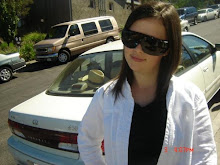 Once again, I have no recollection of who recommended this book to me (I have to start keeping track better!). I was excited to hear about it because I used to watch that show Cold Case, and thought it was really interesting. Although, ultimately it was too effing sad. It's like the producers wanted to give viewers a reason to slit their wrists or something. Seriously, have you seen it? So sad, every week. But again, the idea of a cold case squad and how it works is really interesting to me, so I was happy to get the recommendation (from whoever it was!).
Once again, I have no recollection of who recommended this book to me (I have to start keeping track better!). I was excited to hear about it because I used to watch that show Cold Case, and thought it was really interesting. Although, ultimately it was too effing sad. It's like the producers wanted to give viewers a reason to slit their wrists or something. Seriously, have you seen it? So sad, every week. But again, the idea of a cold case squad and how it works is really interesting to me, so I was happy to get the recommendation (from whoever it was!).Stacy Horn first heard New York City's Cold Case Squad when she met a detective who worked in it and who briefly described the purpose to her. She was so intrigued, she arranged a meeting with members of the squad to see if writing a book would be feasible. I'm not sure how long she spent writing and researching The Restless Sleep , but it must have been at least a couple of years. The history of the formation of the squad and information about its protocol is extensive, as is the research included on homicide statistics in New York City this century. This information is interspersed with accounts of five different cases worked by the squad. The book is broken down into three parts, and each includes one chapter about each of those five cases. The first part is called Catching the Case and explains the various ways that cases are assigned to the squad and the beginning stages of investigations. The second part is called Banging on Doors and covers the middle of the investigations, comprised mainly of tracking down witnesses and suspects and visiting them over and over. The third part is called The Blue Five and centers around closing the case -- or having worked the case until all leads have been investigated and there's nothing left to do. ("The Blue Five" refers to the final piece of documentation in the police file that signals the end of the investigation.)
, but it must have been at least a couple of years. The history of the formation of the squad and information about its protocol is extensive, as is the research included on homicide statistics in New York City this century. This information is interspersed with accounts of five different cases worked by the squad. The book is broken down into three parts, and each includes one chapter about each of those five cases. The first part is called Catching the Case and explains the various ways that cases are assigned to the squad and the beginning stages of investigations. The second part is called Banging on Doors and covers the middle of the investigations, comprised mainly of tracking down witnesses and suspects and visiting them over and over. The third part is called The Blue Five and centers around closing the case -- or having worked the case until all leads have been investigated and there's nothing left to do. ("The Blue Five" refers to the final piece of documentation in the police file that signals the end of the investigation.)
I can't tell you how much I liked this book. It's not always easy to find a non-fiction book that classifies as a page-turner, and this one definitely was for me. The writing was only very rarely dry, which I thought was understandable considering how much information was relayed. I thought the format was very effective, and I really liked how Horn used real-life detectives and their cases to demonstrate how the procedures and protocol are used in practice. I think anyone who is interested in police work or enjoys watching procedural TV shows would enjoy reading about the inner workings of this squad. One caution: If you mind occasional bad language or crude colloquial phrases, be forewarned that both are included in this book. I didn't see it as vulgar, though; I thought Horn was writing in tune with how the detectives spoke with each other. At least, that's my take on it and I thought it really worked in context.


No comments:
Post a Comment